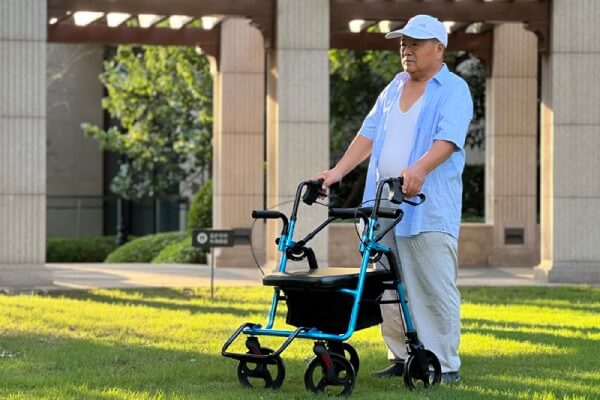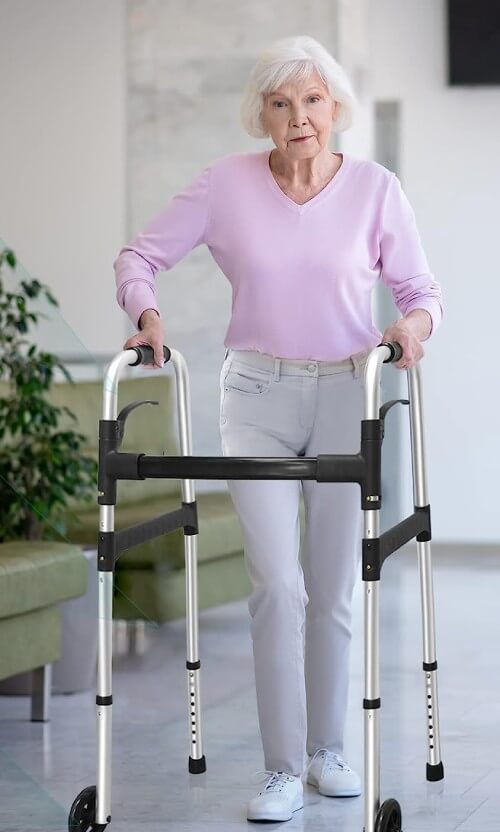Unlocking the secrets to independent mobility for our beloved seniors is like discovering a treasure trove of freedom and joy! As our loved ones gracefully age, staying active and maintaining their independence become precious goals. And that’s where walkers swoop like superheroes, offering the perfect blend of stability and support.
In this exhilarating journey, we’ll unveil different walkers for seniors, exploring the various features and associated costs.
By the end of this article, you’ll clearly understand how much walkers cost seniors and how to choose the best one for your needs.
The Importance of Mobility for Seniors
Maintaining mobility is crucial for seniors’ physical and mental well-being. Mobility allows them to remain socially engaged, stay active, and continue participating in activities they enjoy.
Unfortunately, aging often comes with certain physical challenges, such as reduced balance and muscle strength. This is where walkers can make a significant difference in seniors’ lives.
Types of Walkers for Seniors

1. Standard Walkers
Standard or “pick-up” walkers are the most basic type. They consist of a lightweight, sturdy frame with four legs, providing excellent stability. These walkers are ideal for seniors who require substantial support but can lift the walker with each step.
2. Rollators
Rollators are walkers equipped with wheels, allowing for smoother movement. They typically have handbrakes, a padded seat, and a storage pouch. Rollators are perfect for seniors who need assistance but still have enough strength to walk independently.
3. Knee Walkers
Knee walkers, also known as knee scooters, are an alternative for seniors who have injuries or conditions affecting one leg. Instead of using their feet, users rest their injured leg on a padded platform with wheels, propelling themselves forward with the other leg.
4. Two-Wheeled Walkers
Two-wheeled walkers have two wheels at the front and rubber tips at the back legs. They provide more stability than rollators while offering some mobility assistance. These walkers are suitable for seniors who need partial weight support while walking.
Factors Affecting Walker Prices
Several factors come into play when it comes to the cost of walkers for seniors. Understanding these factors will help you decide and find the best walker within your budget.
1. Walker Type and Features
The type of walker and its features significantly impact the price. Standard walkers are the most affordable, while rollators and knee walkers usually come at a higher cost due to their added functionalities.
2. Material and Build Quality
Walkers made from lightweight yet durable materials like aluminum are more expensive. However, investing in a quality-built walker ensures it lasts longer and provides better support.
3. Weight Capacity
Different walkers have varying weight capacities. Walkers with higher weight capacities are often more expensive as they require stronger construction to support heavier individuals.
4. Brand Reputation
Reputable brands with a track record of producing reliable and ergonomic walkers might come at a premium compared to lesser-known brands.
How Much Are Walkers For Seniors?
Now that we’ve explored the types and factors influencing walker prices let’s get into the specifics of their costs.

1. Standard Walkers
Standard walkers are typically the most affordable option, ranging from $30 to $100. Basic models with minimal features are on the lower end of the spectrum, while those with additional accessories or improved build quality can cost more.
2. Rollators
Rollators offer more features and convenience, resulting in higher price points. Prices for rollators generally range from $80 to $300. The cost depends on the number of wheels, including handbrakes, seat padding, and storage options.
3. Knee Walkers
Knee walkers are specialized devices designed for specific needs. They are priced higher than standard walkers and rollators due to their unique functionality. Knee walkers can cost anywhere from $150 to $500, depending on their design and features.
4. Two-Wheeled Walkers
Two-wheeled walkers are priced similarly to rollators, ranging from $80 to $300. The price variation is influenced by the build quality, weight capacity, and additional features they offer.
Where to Buy Walkers for Seniors?
Walkers for seniors are widely available both in physical stores and online retailers. When purchasing a walker, consider visiting medical supply stores, pharmacies, or big-box retailers specializing in health and wellness products.
Online marketplaces like Amazon, eBay, and dedicated medical equipment websites also offer a vast selection of walkers with user reviews and ratings to guide your choice.
Choosing the Right Walker
Selecting the right walker for a senior requires careful consideration of their specific needs and preferences. Here are some essential tips to help you make the best choice:
1. Assess Mobility Requirements
Determine how much assistance the senior needs. A rollator might be the ideal choice if they only require minimal support. For more significant stability, a standard walker could be more suitable.
2. Consider Storage and Transportation
If the senior plans to use the walker outside the home, consider a foldable, lightweight model for easier storage and transportation.
3. Test for Comfort and Fit
Before purchasing, have the senior test the walker for comfort and proper fit. The handles should be at a comfortable height, and the grips should feel secure.
4. Check Weight Capacity
Ensure the chosen walker can support the senior’s weight, with some additional capacity in case of future changes.
Bottom Line
Walkers for seniors are invaluable tools that promote mobility and independence. Each type serves different needs and budgets, from standard walkers to rollators and knee walkers. When selecting the right walker, consider the specific requirements of the senior, the features offered, and the overall build quality.
With the right choice, seniors can continue to enjoy an active and fulfilling lifestyle. Remember, investing in a high-quality walker is an investment in the well-being and safety of your loved ones.
So, options are available for every budget and requirement, whether you’re searching for a standard walker to provide sturdy support or a feature-packed rollator to offer greater convenience. Take your time to research and choose wisely. Using this comprehensive guide, you’ll be well-equipped to make an informed decision that ensures your senior loved ones can walk confidently, comfortably, and freely.
